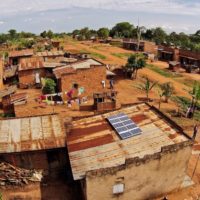Follow our faculty experts in the media

How skills training can boost entrepreneurship and job creation: Evidence from Uganda
April 13, 2022
In this VoxDevTalk, Paul Gertler discusses the Skills for Effective Entrepreneurship Development (SEED) intervention, a three-week residential entrepreneurship skills training programme implemented in Uganda by the World Bank and the NGO Educate! starting in 2012.

The effect of pensions on wellbeing and mental health: Evidence from Paraguay
March 16, 2022
In this VoxDevTalk, Sebastian Galiani discusses his work with Rosangela Bando and Paul Gertler evaluating the effect of the Pensiones Alimentarias scheme in Paraguay.

Berkeley Haas goes all in on sustainability
January 8, 2022
A plan to weave sustainability across the Berkeley Haas curriculum is underway, with faculty adding fresh cases, new class materials, and lectures with industry leaders to their courses.

Pilot Launch| Crypto wallet and remittance service for unbanked Venezuelan refugees
October 13, 2021
Valiu and FinX announce a new pilot in collaboration with Mercy Corps Colombia, Innovations for Poverty Action (IPA), and the Lab for Inclusive FinTech (LIFT). This pilot is FinX’s first aimed at rigorously evaluating the impacts of Valiu’s smartphone app that combines a stablecoin and a remittances service for vulnerable Venezuelan migrants and refugees in Colombia.

One Way to Tackle Extreme Poverty: Replace Dirt Floors
August 23, 2021
For Datar and other activists focused on extreme poverty, floor replacement is a fast and cost-effective way of improving living conditions and public health, especially for children. While earlier public health programs focused on replacing dirt floors with concrete, EarthEnable sought out an alternative that wouldn’t create as many greenhouse gas emissions as producing concrete.

Demand for air conditioning is set to surge by 2050
August 10, 2021
The main concern about air conditioning (AC) is its environmental cost. The United Nations estimates that if hydrofluorocarbons are not phased out, they could cause temperatures to rise by up to an extra 0.4°C by 2100.

A Covid-19 Silver Lining in Latin America: Millions of New Bank Accounts
June 24, 2021
The pandemic has pummeled Latin America and plunged many people into poverty, but the finance sector has reaped an unexpected windfall: Tens of millions in Latin America have opened banking accounts for the first time to store the emergency cash that governments handed out.

Testing financial innovations: Increasing loan repayment using digital collateral
June 18, 2021
Recent technological innovations have facilitated the use of digital collateral without the need for costly and inefficient physical repossession, where findings help validate how securing a loan with digital collateral can lead to positive benefits for both borrower and lender.

Hard skills or soft skills for the youth?
June 2, 2021
Laura Chioda, David Contreras-Loya, Paul Gertler and Dana Carney set up two mini-MBA trainings for Ugandan students about to graduate from secondary school. These trainings test how the development of hard skills and soft skills may matter a lot for economic outcomes.

A New Approach to Lending in Low- and Middle-Income Countries
June 2021
While microfinance has not broadly succeeded in relaxing credit constraints for the poor in low- and middle-income countries, a new form of credit using “digital collateral” is effective, a study by Paul Gertler, Brett Green, and Catherine Wolfram finds

How Debit Cards Are Helping Low-Income Households Save—and Benefiting Their Neighbors Too
April 1, 2021
Sean Higgins, an assistant professor of finance at the Kellogg School, is investigating the reach of one potentially powerful tool: debit cards. In two recent research projects, he examines the impact of the Mexican government’s decision to distribute debit cards to poor families so that they could receive their cash-transfer payments from the government.

Promoting Parental Involvement in Schools
December 4, 2020
Parent engagement has long been touted as a component of student success. In a new working paper, researchers Felipe Barrera-Osorio of Vanderbilt, Paul Gertler of UC Berkeley, Nozomi Nakajima of Harvard, and Harry Patrinos of the World Bank examine the impact of parental involvement interventions on parent behavior and student success.

New, Strong Evidence For Problem-Based Learning
October 29, 2019
Two new large-scale reports provide convincing empirical evidence that problem- or inquiry-based learning is effective and that teachers, students and parents prefer it as an instructional method – along with other active, immersive techniques.

